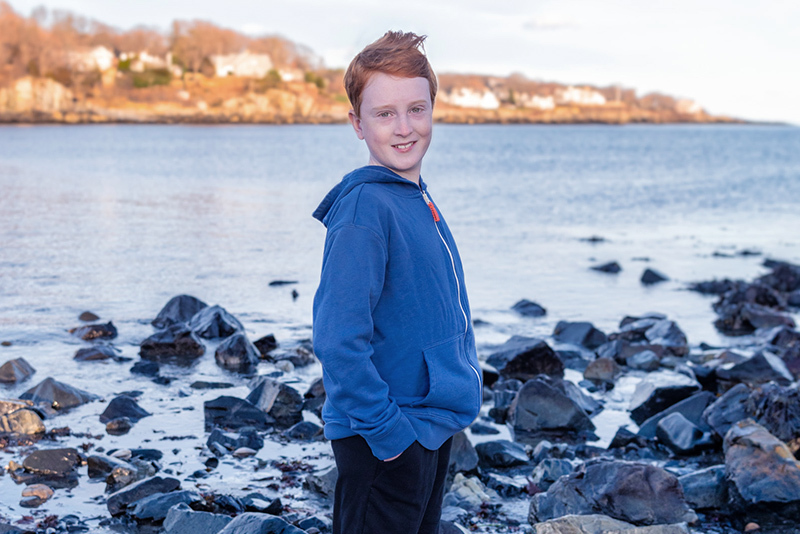Understanding ARFID: Finding specialized care for Thomas

On a late summer day last year, Thomas Donovan took the elevator to the eleventh floor of Boston Children’s Hospital. Although he liked the fresh air and view of the city, they weren’t his main motivations for visiting the rooftop garden. Instead, Thomas was there to capture a wild Pokémon. And he wasn’t just playing the popular mobile game for fun. Pokémon Go had come recommended by gastroenterologist Dr. Athos Bousvaros.
“He told me it was a great way to get out of my hospital room and start moving around,” says Thomas, 13.
When food breeds anxiety
Thomas’s journey to Boston Children’s began earlier in 2021, when he started feeling sick. Always small for his age, he had more trouble than usual gaining weight, and his energy dipped dramatically. After a series of tests, he was eventually diagnosed with celiac disease. In this condition, a substance called gluten damages the lining of the intestines, preventing them from absorbing nutrients.
But the diagnosis of celiac disease was “just part of the story,” says Thomas’s mom, Wendy.
Because treatment for celiac disease involves avoiding gluten and the many foods that contain it, Thomas found himself paying careful attention to what he ate — maybe too careful. Before long, food started to become a source of stress for him. “I felt really anxious and worried about what I could eat and drink,” remembers Thomas. “I started washing my hands a lot, too.”
As he lost weight and continued to feel sick, it was clear that the problem wasn’t simply picky eating or general anxiety. Wendy knew it was time to find help.
‘We can help you’
Despite his pediatrician’s best efforts, it became clear that Thomas needed more specialized care. Wendy learned about Boston Children’s Avoidant/Restrictive Food Intake Disorder (ARFID) Program from a physician friend. Although Wendy worried that she and Thomas still wouldn’t have answers about his health, those fears ebbed when they arrived in Boston from their home in Southern Maine. “The team jumped right into action,” she says. “They told us, ‘We know what this is, and we can help you.’”
Led by Dr. Elana Bern, the program’s co-director, Thomas’s care team included gastroenterologists, psychologists, nutritionists, and nurses to address all aspects of the condition. Because his weight had dropped to just 60 pounds, he was hospitalized for a month to get his weight and nutrition levels back up and help him control his anxiety. “It was hard not being there with him all the time,” says Wendy. “But the nurses on 7 West knew exactly how to care for him.”
Finding coping tools
While no kid wants to spend part of their summer in the hospital, Thomas made the best of it. He didn’t love the temporary feeding tube that helped deliver nutrition, but when he talks about his experience now, he remembers the positives: “I liked riding in the elevator and taking the musical stairs,” he says. “It was fun to watch the helicopters from the roof garden, and the Mickey Mouse face masks were kind of cool.”
Thomas remembers various members of his care team fondly too. In addition to talking with Drs. Bern and Bousvaros, he bonded with Dr. Charles Wulff over Star Wars and found psychologist Dr. Kevin Tsang helpful to speak with. These relationships helped Thomas actively engage in treatment and challenge back his anxious thoughts and behaviors. He also received care from dietitian Lauren Mudgett, as well as a team of dedicated inpatient nurse practitioners, including Eileen Costello, Megan Dube, and Megan McPhee.
By the time Thomas was able to leave the hospital and return home, he had gained weight — and some valuable tools for coping with food-related anxiety and other aspects of ARFID.
Trusting your instincts
Today, Thomas no longer needs a feeding tube and is feeling much more energetic. He’s back to playing tennis, riding his bike, hanging out with his friends, and will soon rejoin his school’s jazz band, where he will play the trumpet. He’s comfortable eating more kinds of food, and attends another intensive outpatient program on managing his extreme food anxiety.
“When it comes to your child, trust your instincts,” says Wendy. “And trust that even if it seems impossible at first, ARFID can get better with the right treatment. It can take time and a lot of work to get out of the woods. We were so lucky to have an amazing team working with Thomas.”
“And,” advises Thomas, “play Pokémon Go.”
What is ARFID?
Kids and teens with ARFID may limit the amount and/or types of food they eat because:
– They avoid certain foods or entire food groups due to sensory features, such as the food’s appearance, texture, or taste.
– They have a lack of interest in eating (low appetite).
– They have a fear of negative consequences from eating, such as a fear of vomiting, pain, or choking.
This can lead to nutritional, medical, and social challenges that require comprehensive care.
Learn more about the Avoidant/Restrictive Food Intake Disorder (ARFID) Program
Related Posts :
-

"I am a superhero": Joecel and his mom work to address feeding challenges
Joecel Castillo loves Spiderman, Batman, He-Man — and pancakes. They’re the sorts of favorites that might show up on any 5...
-

Making food fun: Jacob’s journey with feeding difficulties
Most parents might discourage their child from playing with their food. But for Lorraine Scanlon, getting her son Jacob to ...
-

Answers to six questions about anxiety in children and teens
Between school and social demands, lots of children feel stress, but at what point does anxiety cross the line and ...
-

Ava's mental health journey
Ava remembers filling a small pink notebook with all her worries in just one month when she was 5 years old. ...





